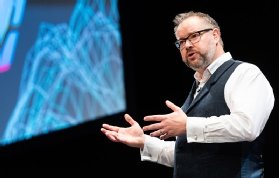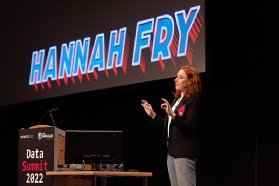Data Summit majors on ethics in data use, demonstrates diversity

The Data Lab’s Data Summit conference in Edinburgh took the ethical use of data as an over-arching theme.
Speakers included science broadcaster Hannah Fry, Nasa’s chief science data officer, Kevin Murphy, Edinburgh University global public health chair Devi Sridhar, and Tom Arthur, minister for public finance, planning and community wealth in the Scottish government.
The strapline for the conference was “Data: A new hope”, and it aimed to focus on how data and artificial intelligence (AI) can be used to create a better world and society.
Brian Hills, CEO of The Data Lab, said: “While more businesses adopted digital technology during the pandemic and have lots of fantastic data, many still need to understand how to use it, and know they must get it right in terms of the ethics.
“I hope the event has inspired delegates to believe that Scotland can become home to the world’s most impactful data community, nurturing companies that will change the world for the better through a greater understanding of data and its implementation.”
Arthur, in a keynote address, confirmed the Scottish government’s interest in data and its potential to secure a better future for society, but cautioned it must be used ethically, or it won’t gain public support.

First minister Nicola Sturgeon said, in a statement in support of the government-backed organisation: “Data is central to the Scottish government’s vision for our economic future. It is an area where Scotland already excels, where we are ambitious to do better, and which has potential for significant economic opportunities and important social benefits.
“Data is absolutely crucial to tackling social and economic challenges, creating jobs and wealth, and improving people’s health and well-being. The talent, innovation and energy on display at an event like Data Summit demonstrates that the data sector here in Scotland is in good health.”
The conference took place at Edinburgh International Conference Centre on 3 and 4 November. It had a range of speakers that included quantum computing professors, nanotechnologists, entrepreneurs, data ethicists, philosophers, musicians and artists.
The first day’s roster of speakers was predominantly female, and included Stephanie Hare, whose book Technology is not neutral was named by the Financial Times as one of its tech books of the year. She discussed how technological innovation overwhelmingly ignores women and the embedded bias within AI.

Science broadcaster Hannah Fry gave the first day’s closing keynote and demonstrated how even well-intentioned data science projects can end up being biased, and how women in particular are incrementally made to feel that fields like mathematics or endeavours like Formula One car racing are not for women – unless they are “grid girls”, as in the case of F1.
Devi Sridhar, a professor at the University of Edinburgh Medical School and a personal chair in Global Public Health, talked about the use of data during the Covid-19 pandemic, and what problems lack of trust in data could cause in terms of public health.
Nasa’s chief science data officer, Kevin Murphy, talked about Nasa’s Earth System Observatory and the value of open access data.
Delegates attended the summit from across Scotland, including a group of students from Stirling High School studying National Five, Higher and Advanced Highers in computer science.



